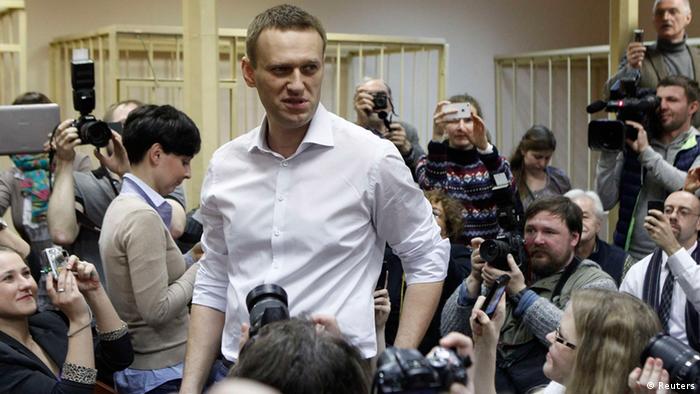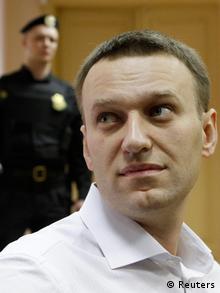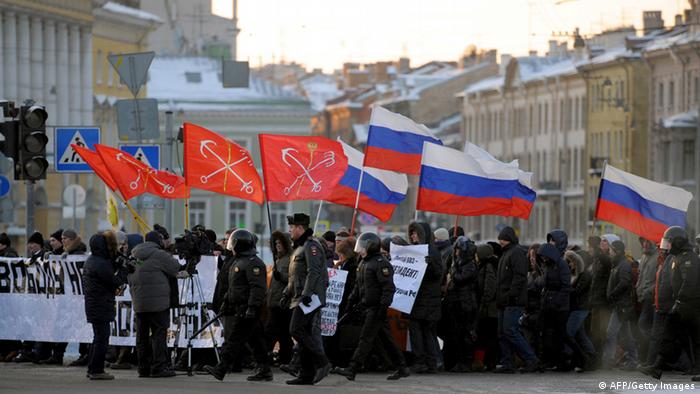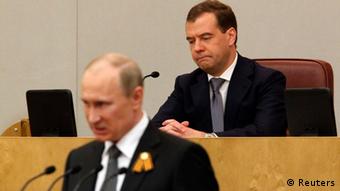Observers speak of a political trial. But for Russian blogger Alexei Navalny, charges of "economic crimes" are very real - and might destroy his presidential candidacy. Who is the man caught in the Kremlin's crosshairs?
Irony was always his trademark - and he hasn't lost any of it.
"I was in the train," Alex Navalny tweeted on the morning of April 18, 2013, "and when I woke up, I found out there was another investigation against me about to get underway."
As Russia's best-known blogger and opposition politician, Navalny was on his way to Kirov, a city 900 kilometers to the northeast of Moscow. There, a trial against had begun one day earlier - against him.
In total, at least five further charges have been added to the original one against Navalny, each an "economic crime" like the first accusation.
It was in Kirov, a central Russian city of just under half a million people, that Navalny was first accused of having cheated a state-run logging company called Kirovles out of 400,000 euros ($519,000). The 36-year-old denies this accusation and the others, and speaks of a politically motivated trial.
A leading critic
As both a lawyer and blogger, Navalny is considered a leading critic of the Kremlin. He was the first to call United Russia - the ruling centrist party of Russian President Vladmir Putin and Prime Minister Dmitry Medvedev - the "party of crooks and thieves." It was also Navalny who called upon Russians to document irregularities in the 2011 parliamentary election. Around ten thousand Russians heeded his call.
"Tall," "blonde" and "striking" is how American journalist Julia Ioffe, a Moscow correspondent for the New Yorker and Foreign Policy magazines, describes him.
"He's the only politician in Russian today with potential," she told DW.
Navalny, she feels, "is from the middle-class - and understands their worries."
Part-time politician
But Navalny is not a "politician" in the classic sense. He is backed by no political party in Russia and studied law and asset markets in Moscow. Thereafter he spent time at Yale University in the US.
Between 2000 and 2007 he became involved with Russia's social-liberal Yabloko party, which aims for enhanced integration with the West and membership in the European Union. Due to controversial statements made by Navalny, however, he was kicked out of that party.
Generally, Navalny considers himself a "reasonable nationalist." Until just a few years ago, he even took part in the "Russian Marches" - annual mass demonstrations in major Russian cities organized by strongly nationalist and anti-immigration political groups. Navalny later distanced himself from those actions, yet simultaneously said he wanted a highly populous Russian state "not to make taboo" the issue of immigration.
Navalny's conviction, says Ioffe, is shared by a segment of Russia's middle class. She further believes that his participation in the marches was a "cynical maneuver" to garner more support from the Russian populace at large.
Jens Siegert of the Moscow branch of the Heinrich Böll Stiftung, a German political foundation, shares that criticism: "I think Navalny was playing with fire there," Siegert told DW.
Blogger for president?
Yet what truly elevated Navalny to the level of national politics was the Internet. His blog on Russia's LiveJournal is read by hundreds of thousands. He also runs other Internet sites where a network of Russian citizens works to expose the corruption and internal machinations of state-run companies. A number of United Russia parliamentarians have resigned as a result of revelations made on Navalny's site.
By autumn 2012, Navalny had received the highest number of votes to head the opposition's coordination council, which views itself as the leadership of the opposition protest movement. Navalny truly took on that role at demonstrations for democracy just a few months later. He organized protests and was arrested repeatedly - but only temporarily.
Finally, and just shortly before the beginning of the courtroom trial in Kirov, Navalny made clear that his ambitions were no less than for his country's highest office. "I want to become president and change the way we live in this country," he said.
Observers, however, believe Navalny is simply trying to draw more attention to his case. "Passing judgment on a presidential candidate is something different from if it's a normal opposition politician," said Jens Siegert of the Henrich Böll Stiftung.
As to whether Navalny truly stands a chance in Russia's presidential election in 2018, only time will tell. Surveys show anywhere from 13 to 19 percent of Russians in support of a Navalny presidency. Should he be found guilty, his path to the Kremlin would be barred.
In fact, even if the court imposes a suspended sentence, that would count as a previous conviction, meaning he would be banned from any future presidential candidacy. dw de




Comments